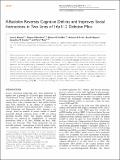| dc.contributor.author | Stoppel, Laura Jane | |
| dc.contributor.author | Kazdoba, Tatiana M | |
| dc.contributor.author | Schaffler, Melanie D | |
| dc.contributor.author | Preza, Anthony R. | |
| dc.contributor.author | Heynen, Arnold J | |
| dc.contributor.author | Crawley, Jacqueline N | |
| dc.contributor.author | Bear, Mark | |
| dc.date.accessioned | 2020-08-07T18:18:37Z | |
| dc.date.available | 2020-08-07T18:18:37Z | |
| dc.date.issued | 2017-10 | |
| dc.date.submitted | 2017-08 | |
| dc.identifier.issn | 0893-133X | |
| dc.identifier.issn | 1740-634X | |
| dc.identifier.uri | https://hdl.handle.net/1721.1/126513 | |
| dc.description.abstract | Human chromosome 16p11.2 microdeletion is among the most common gene copy number variations (CNVs) known to confer risk for intellectual disability (ID) and autism spectrum disorder (ASD) and affects an estimated 3 in 10 000 people. Caused by a single copy deletion of ∼27 genes, 16p11.2 microdeletion syndrome is characterized by ID, impaired language, communication and socialization skills, and ASD. Studies in animal models where a single copy of the syntenic 16p11.2 region has been deleted have revealed morphological, behavioral, and electrophysiological abnormalities. Previous studies suggested the possibility of some overlap in the mechanisms of pathophysiology in 16p11.2 microdeletion syndrome and fragile X syndrome. Improvements in fragile X phenotypes have been observed following chronic treatment with R-baclofen, a selective agonist of GABA B receptors. We were therefore motivated to investigate the effects of chronic oral R-baclofen administration in two independently generated mouse models of 16p11.2 microdeletion syndrome. In studies performed across two independent laboratories, we found that chronic activation of GABA B receptors improved performance on a series of cognitive and social tasks known to be impaired in two different 16p11.2 deletion mouse models. Our findings suggest that R-baclofen may have clinical utility for some of the core symptoms of human 16p11.2 microdeletion syndrome. | en_US |
| dc.description.sponsorship | National Institutes of Health (Grants R01NS085709, U54HD079125) | en_US |
| dc.language.iso | en | |
| dc.publisher | Springer Science and Business Media LLC | en_US |
| dc.relation.isversionof | http://dx.doi.org/10.1038/npp.2017.236 | en_US |
| dc.rights | Creative Commons Attribution-Noncommercial-Share Alike | en_US |
| dc.rights.uri | http://creativecommons.org/licenses/by-nc-sa/4.0/ | en_US |
| dc.source | Nature | en_US |
| dc.title | R-Baclofen Reverses Cognitive Deficits and Improves Social Interactions in Two Lines of 16p11.2 Deletion Mice | en_US |
| dc.type | Article | en_US |
| dc.identifier.citation | Stoppel, Laura J. et al. "R-Baclofen Reverses Cognitive Deficits and Improves Social Interactions in Two Lines of 16p11.2 Deletion Mice." Neuropsychopharmacology 43, 3 (October 2017) 513–524 © 2017 Springer Nature | en_US |
| dc.contributor.department | Picower Institute for Learning and Memory | en_US |
| dc.contributor.department | Massachusetts Institute of Technology. Department of Brain and Cognitive Sciences | en_US |
| dc.relation.journal | Neuropsychopharmacology | en_US |
| dc.eprint.version | Final published version | en_US |
| dc.type.uri | http://purl.org/eprint/type/JournalArticle | en_US |
| eprint.status | http://purl.org/eprint/status/PeerReviewed | en_US |
| dc.date.updated | 2019-09-27T18:24:18Z | |
| dspace.date.submission | 2019-09-27T18:24:19Z | |
| mit.journal.volume | 43 | en_US |
| mit.journal.issue | 3 | en_US |
| mit.metadata.status | Complete | |

